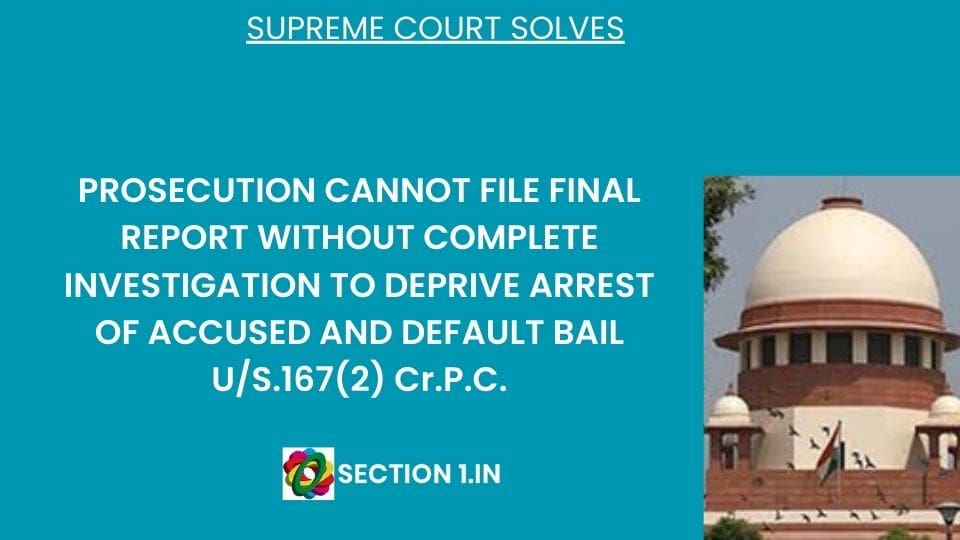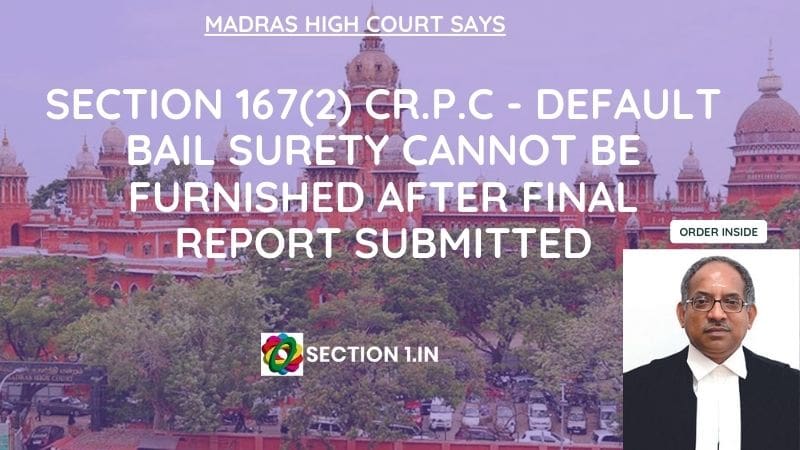ISSUES
9. In light of the abovementioned arguments raised by the learned counsel for the parties, the following three issues arise for our consideration:-
I. Can a chargesheet or a prosecution complaint be filed in piecemeal without first completing the investigation of the case?
II. Whether the filing of such a chargesheet without completing the investigation will extinguish the right of an accused for grant of default bail?
III. Whether the remand of an accused can be continued by the trial court during the pendency of investigation beyond the stipulated time as prescribed by the CrPC?
S. 167(2) Cr.P.C FLOWS FROM FUNDAMENTAL RIGHTS
14. It is also pertinent to note that the relief of statutory bail under Section 167(2) of the Cr.PC, in our opinion, is a fundamental right directly flowing from Article 21 of the Constitution of India, and the violation of such a right, as mentioned above, directly attracts consideration under Article 32 of the Constitution. In such circumstance, we are not inclined to agree with the preliminary objections raised by the learned counsel for the respondent regarding the maintainability of this petition under Article 32 of the Constitution and the said objection, therefore, stands rejected.
xxx
HISTORY OF BAIL
16. For the purpose of deciding the issues framed by us, we deem it appropriate to trace the history of the provision of default bail, and the reasons which led the legislature to incorporate the existing provisions in the new statute. Under Section 167 of the Code of Criminal Procedure, 1898, which was the Act that governed criminal procedure before the enactment of CrPC presently in force, an accused, either under judicial or police custody, could be remanded only for a maximum period of 15 days.
17. This period of 15 days, however, more often than not, was inadequate to conclude investigations, especially in complicated cases which required a longer and deeper investigation. This lack of time, because of the abovementioned provision of the 1898 Act, led to a widespread practice wherein investigating officers would file preliminary chargesheets after the expiry of the remand period, and subsequently request the magistrate to postpone the commencement of trial and remand the accused under Section 344 of the 1898 Act for a further time, till the final chargesheet was filed.
18. This practice of filing preliminary chargesheets was first pointed out by the Law Commission of India in its Report No. 145 on Reforms of the Judicial Administration, wherein it was stated that in many cases, the accused persons, without the filing of any detailed reports before the courts by the investigating authority, were languishing in jail for a prolonged period of time. It thus recommended that there existed an urgent need for a provision that provided for an appropriate time frame for the completion of an investigation while also safeguarding the personal liberty of the accused.
19. These recommendations made by the abovementioned law commission report were again emphasized by the Law Commission in its Report No. 416, wherein it was explicitly stated that there was an urgent need to protect the civil liberties of accused persons against the misuse of Section 344 of the 1898 Act, wherein the accused persons, on grounds of a preliminary report and pending investigation, were remanded to custody indefinitely.
20. On the recommendation made by the Law Commission through the aforesaid reports recommending to curtail the abuse of such power, Section 167(2) as it exists today in the statute was incorporated in the Cr.P.C, 1973, which provides for a longer period of maximum remand, but also guarantees default bail, to ensure that accused persons are bereft of arbitrary detention.
OBJECT OF S. 167(2) Cr.P.C
21. A bare perusal of the abovementioned statement of objects strongly indicates that Section 167(2) of the Cr.P.C was enacted to ensure that the investigating agency completes the investigation within the prescribed time limit, failing which no accused could be detained if they are willing to avail bail. This position was also laid emphasis on by a three-judge bench of this Court in the case of M. Ravindran Vs. Directorate Of Revenue Intelligence (Supra), the relevant paragraphs of the same are being reproduced hereunder:
“The suggestion made in Report No. 14 was reiterated by the Law Commission in Report No. 41 on The Code of Criminal Procedure, 1898 (Vol. I, 1969, pp. 76-77). The Law Commission re-emphasised the need to guard against the misuse of Section 344 of the 1898 Code by filing “preliminary reports” for remanding the accused beyond the statutory period prescribed under Section 167. It was pointed out that this could lead to serious abuse wherein “the arrested person can in this manner be kept in custody indefinitely while the investigation can go on in a leisurely manner”. Hence the Commission recommended fixing of a maximum time-limit of 60 days for remand.
It was in this backdrop that Section 167(2) was enacted within the present day CrPC, providing for time-limits on the period of remand of the accused, proportionate to the seriousness of the offence committed, failing which the accused acquires the indefeasible right to bail.”
22. Further, this legal position was again reiterated in Satendar Kumar Antil vs CBI & Anr- (2021) 10 SCC 773, wherein it was held that Section 167(2) of the Cr.P.C is a limb of Article 21 of the Constitution of India, and as such, the investigating authority is under a constitutional duty to expediate the process of investigation within the stipulated time, failing which, the accused is entitled to be released on default bail.
23. It is also to be noted that as per the scheme of Cr.P.C, an investigation of a cognizable case commences with the recording of an FIR under Section 154 Cr.P.C. If a person is arrested and the investigation of the case cannot be completed within 24 hours, he has to be produced before the magistrate to seek his remand under Section 167(2) of the Cr.P.C during continued investigation. There is a statutory time frame then prescribed for remand of the accused for the purposes of investigation, however, the same cannot extend beyond 90 days, as provided under Section 167(2)(a) (i) in cases where the investigation relates to an offence punishable with death, imprisonment for life or imprisonment for a term of not less than 10 years and 60 days, as provided under Section 167(2)(a)(ii), where the investigation relates to any other offence. The relevant section further provides that on expiry of the period of 90 days or 60 days, as the case may be, the accused has a right to be released on default bail in case he is prepared to and furnishes bail.
24. This right of statutory bail, however, is extinguished, if the charge sheet is filed within the stipulated period. The question of resorting to a supplementary chargesheet u/s 173(8) of the Cr.P.C only arises after the main chargesheet has been filed, and as such, a supplementary chargesheet, wherein it is explicitly stated that the investigation is still pending, cannot under any circumstance, be used to scuttle the right of default bail, for then, the entire purpose of default bail is defeated, and the filing of a chargesheet or a supplementary chargesheet becomes a mere formality, and a tool, to ensue that the right of default bail is scuttled.
25. It is thus axiomatic that first investigation is to be completed, and only then can a chargesheet or a complaint be filed within the stipulated period, and failure to do so would trigger the statutory right of default bail under Section 167(2) of Cr.PC. In the case of Union Of India vs Thamisharasi & Ors – (1995) 4 SCC 190, which was a case under the Narcotic Drugs and Psychotropic Substances Act, 1985, on finding that the investigation was not complete and a chargesheet was not filed within the prescribed period, denial of default bail was held to be in violation of Article 21 of the Constitution of India, and it was further held that even the twin limitation on grant of bail would not apply.
26. Further, in the case of Ashok Munilal Jain & Anr. Vs. Assistant Director, Directorate of Enforcement – (2018) 16 SCC 158, it was held that the right of default bail under section 167(2) CrPC was held to be an indefeasible right of the accused even in matters under PMLA.
27. Therefore, in light of the abovementioned discussions, it can be seen that the practice of filing preliminary reports before the enactment of the present CrPC has now taken the form of filing chargesheets without actually completing the investigation, only to scuttle the right of default bail. If we were to hold that chargesheets can be filed without completing the investigation, and the same can be used for prolonging remand, it would in effect negate the purpose of introducing section 167(2) of the CrPC and ensure that the fundamental rights guaranteed to accused persons is violated.
28. We have carefully perused the judgments relied upon by the learned counsel for the respondent, however, none of the judgments relied upon permit the abuse of remand under Section 309(2) of the Cr.P.C by permitting the filing of incomplete chargesheets only to scuttle the right of statutory bail.
29. The judgment in State of West Bengal vs. Salap Service Station & Ors – 1994 Supp (3) SCC 318 relied upon by the respondent was rendered, not in the context of default bail, but only in the context of entitlement u/s. 173(8) of the CrPC to place on record further evidence in support of the chargesheet already filed.
30. Further, the judgment of Dharam Pal vs. State Of Haryana & Ors – 2016 (4) SCC 160, relied upon by the respondent, refers to the power of Constitutional Courts to transfer investigation. In Para 21 of the said judgment, it has been stated that Section 173 empowers the police officer to conduct an investigation to file a report on the completion of the investigation and section 173(8) CrPC allows the conduct of further investigation. However, this judgment also does not talk about default bail and the misuse of the filing of supplementary chargesheets. It is also important to note that the judgment of Ram Narain Popli vs. CBI – (2003) 3 SCC 641 and Rajesh Ranjan Yadav vs. CBI – (2007) 1 SCC 70 have also not dealt with the issues being considered by us in the present matter.
32. In view of the above mentioned discussions, the issues framed by us stand answered as under:-
I. Without completing the investigation of a case, a chargesheet or prosecution complaint cannot be filed by an investigating agency only to deprive an arrested accused of his right to default bail under Section 167(2) of the CrPC.
II. Such a chargesheet, if filed by an investigating authority without first completing the investigation, would not extinguish the right to default bail under Section 167(2) CrPC.
III. The trial court, in such cases, cannot continue to remand an arrested person beyond the maximum stipulated time without offering the arrested person default bail.
PARTY: RITU CHHABARIA vs. UNION OF INDIA & ORS. – WRIT PETITION (CRIMINAL) NO. 60 OF 2023 – 26th APRIL, 2023.
https://main.sci.gov.in/supremecourt/2023/6873/6873_2023_13_1501_44023_Judgement_26-Apr-2023.pdf\






